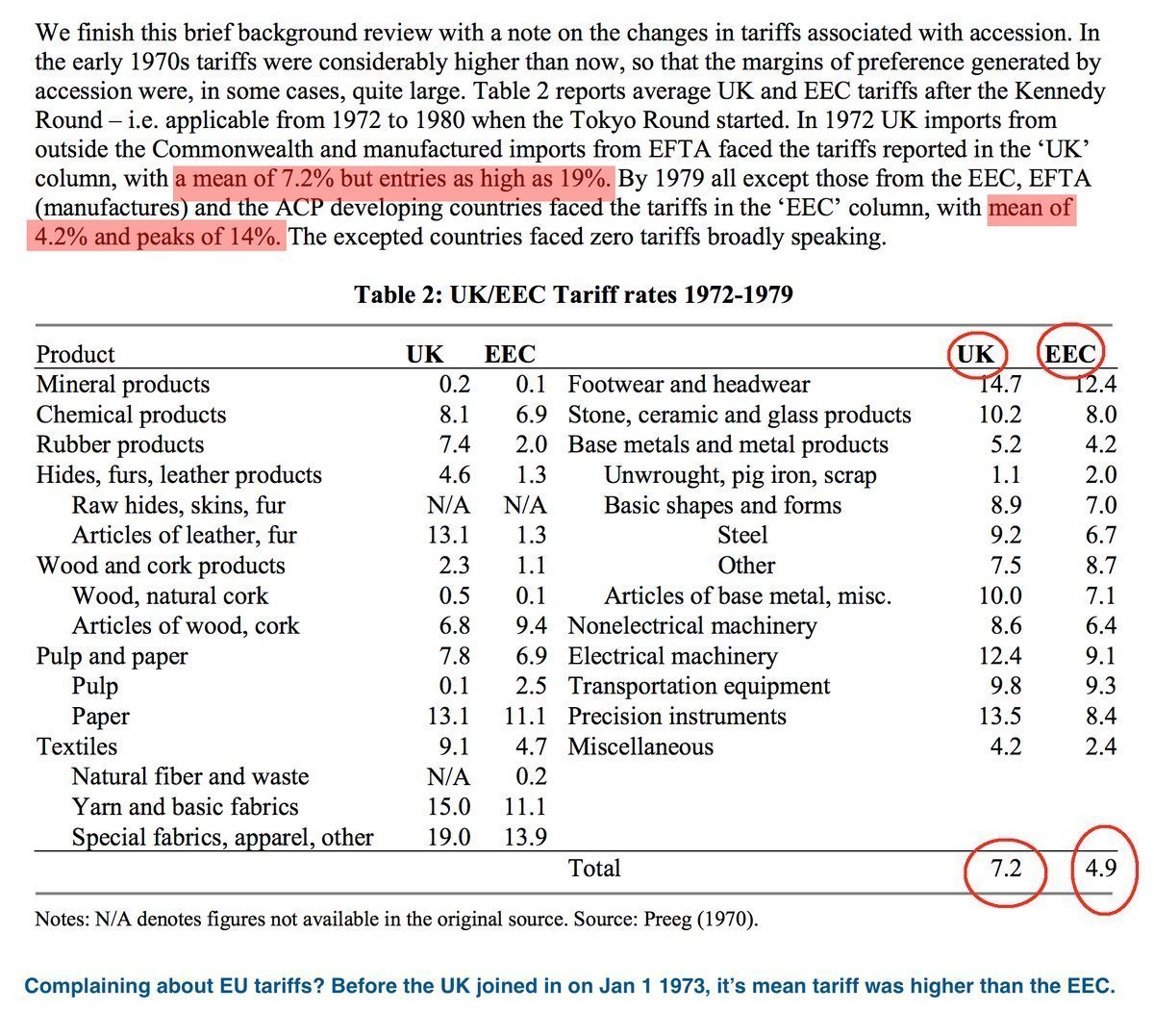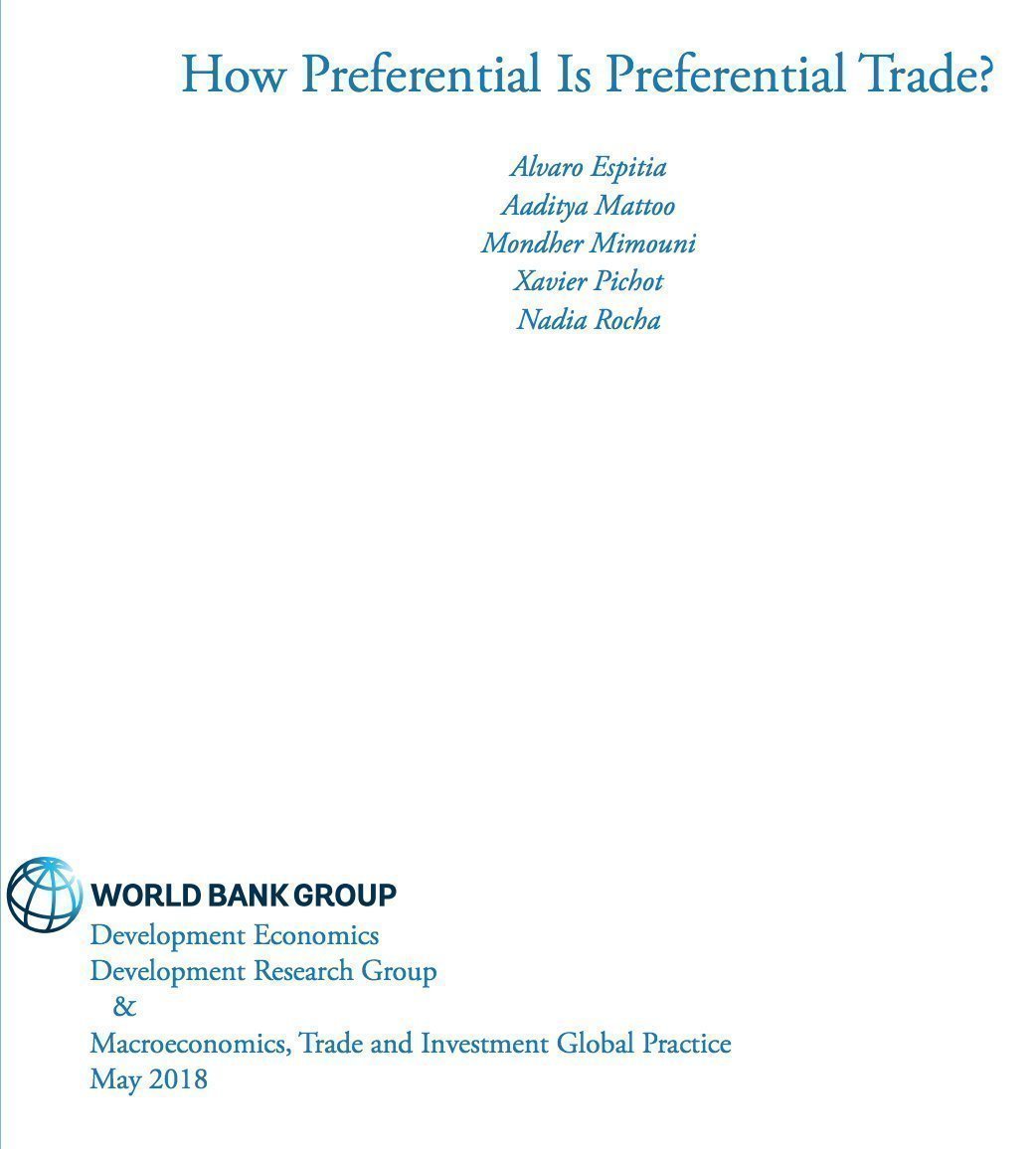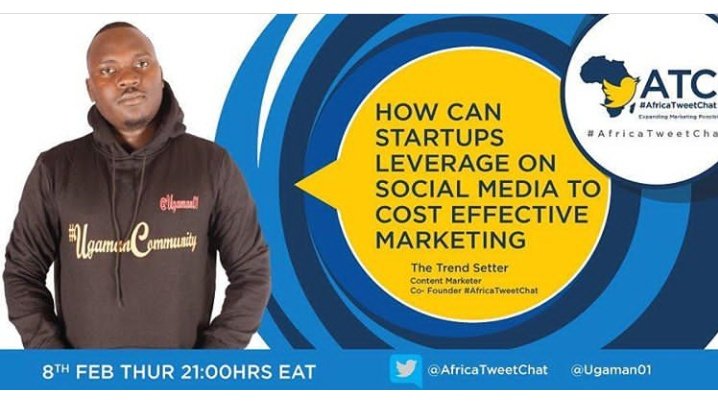This thread examines claims made in this BrexitCentral article by Kevin Dowd regarding an alleged quintupling of tariffs on oranges from South Africa imported into the EU.
I'm not the first person to look at this, but it's worth a full explanation.
brexitcentral.com/eu-thousands-s…
In Aug 2017 Kevin Dowd published a report for the IEA called "A Trade Policy for Brexit Britain". It included some inaccurate commentary about EU tariffs. The BrexitCentral article sought to defend his claims, stating that his source was "leading authority" Dan Lewis.
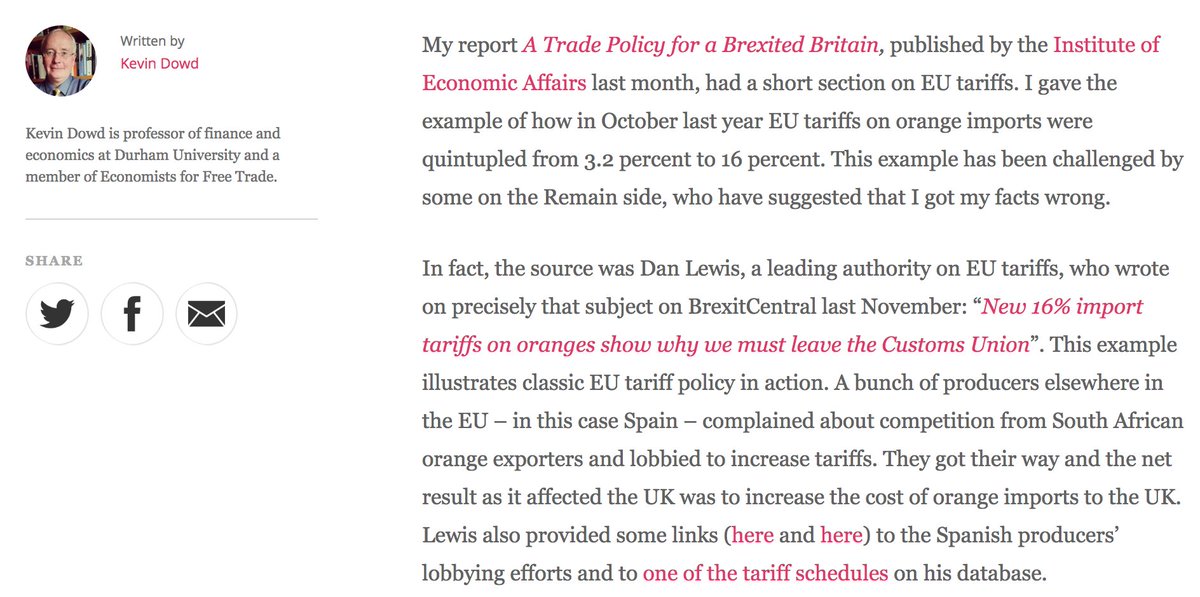
Unfortunately all he demonstrated was that his chosen expert has no more understanding of the subject that he has. Dowd points to another BrexitCentral article from Lewis published in November 2016 and repeats Lewis's fundamentally flawed analysis.
brexitcentral.com/dan-lewis-new-…
Lewis's basic claim is that tariffs on South African oranges were lowered. Spanish producers complained and consequently tariffs were raised fivefold increasing prices for consumers, This therefore is symptomatic of the "protectionist EU racket".
This is utter rubbish.
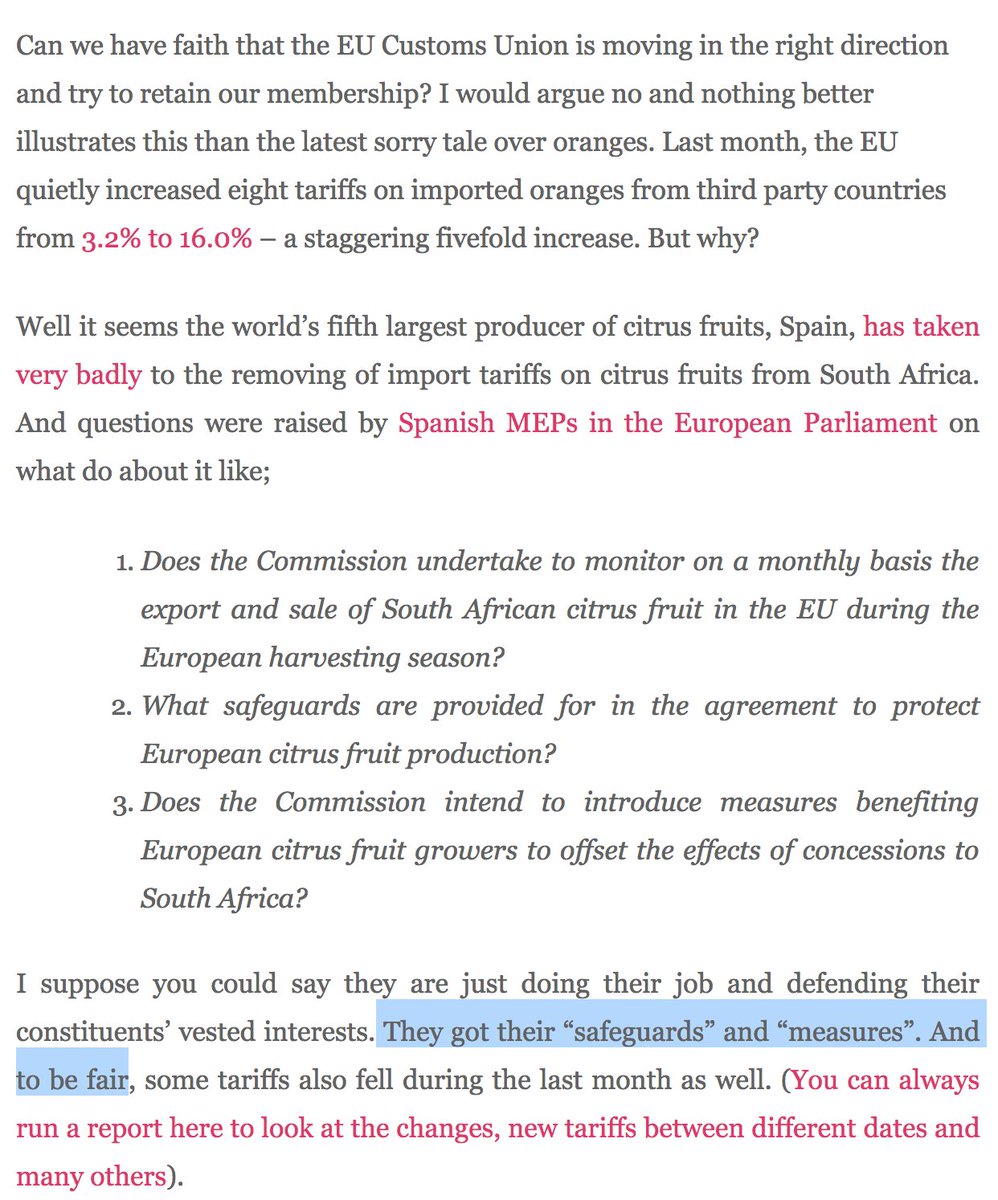
One fact is true. The MFN tariff went from 3.2% to 16% on the 16 Oct 2016.
But it does this every year and has done at least since the Entry Price System was introduced in 1995. There's a good reason why it does so and Spanish MEPs complaining played no part in it at all.
Produce like oranges is seasonal and with South Africa being in the southern hemisphere they are harvesting their oranges about 6 month earlier/later than we harvest ours in the northern hemisphere.
To be precise, the season for oranges produced in the EU runs from late October to early June. The export season for oranges produced in South Africa runs from early May to late November, so they overlap only in May/June and October/November.
researchspace.ukzn.ac.za/bitstream/hand…
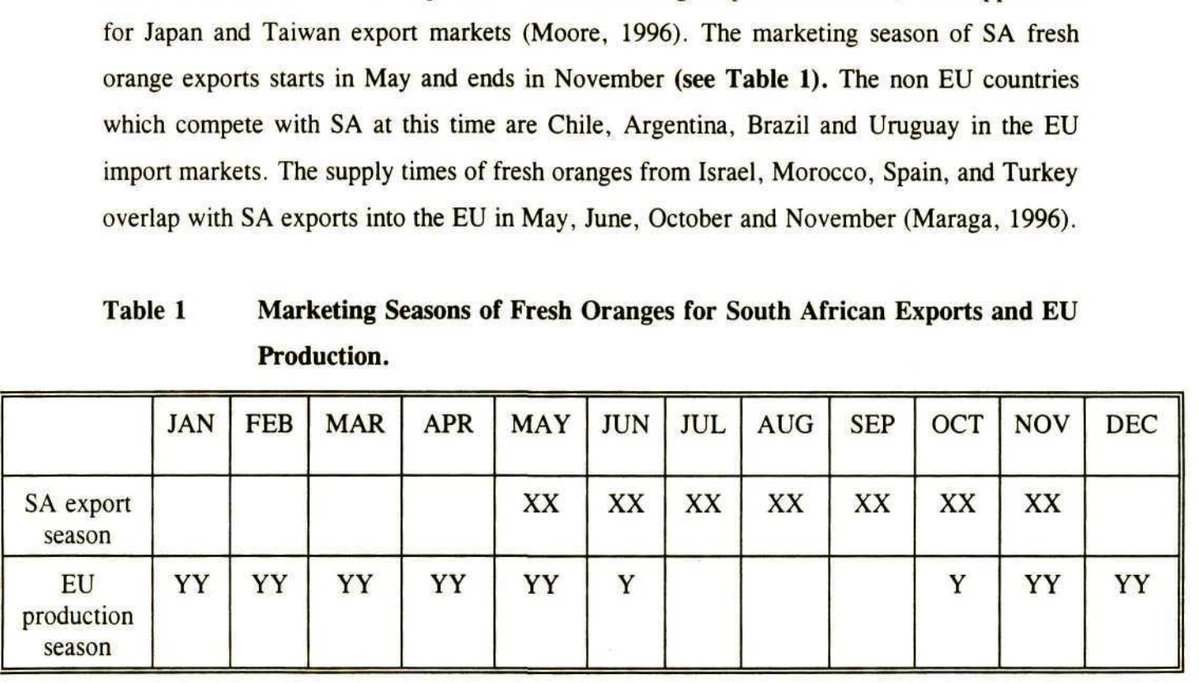
Most of the year they are not in direct competition but when oranges are being exported from the southern hemisphere outside of the season it's likely that they've been in cold storage or are late season and a lower quality. That's not good for consumers.
So the rate of tariff changes with the seasons and has done since at least 1995.
This chart shows that virtually no oranges are exported from South Africa between November and April.
kzndard.gov.za/images/Documen…
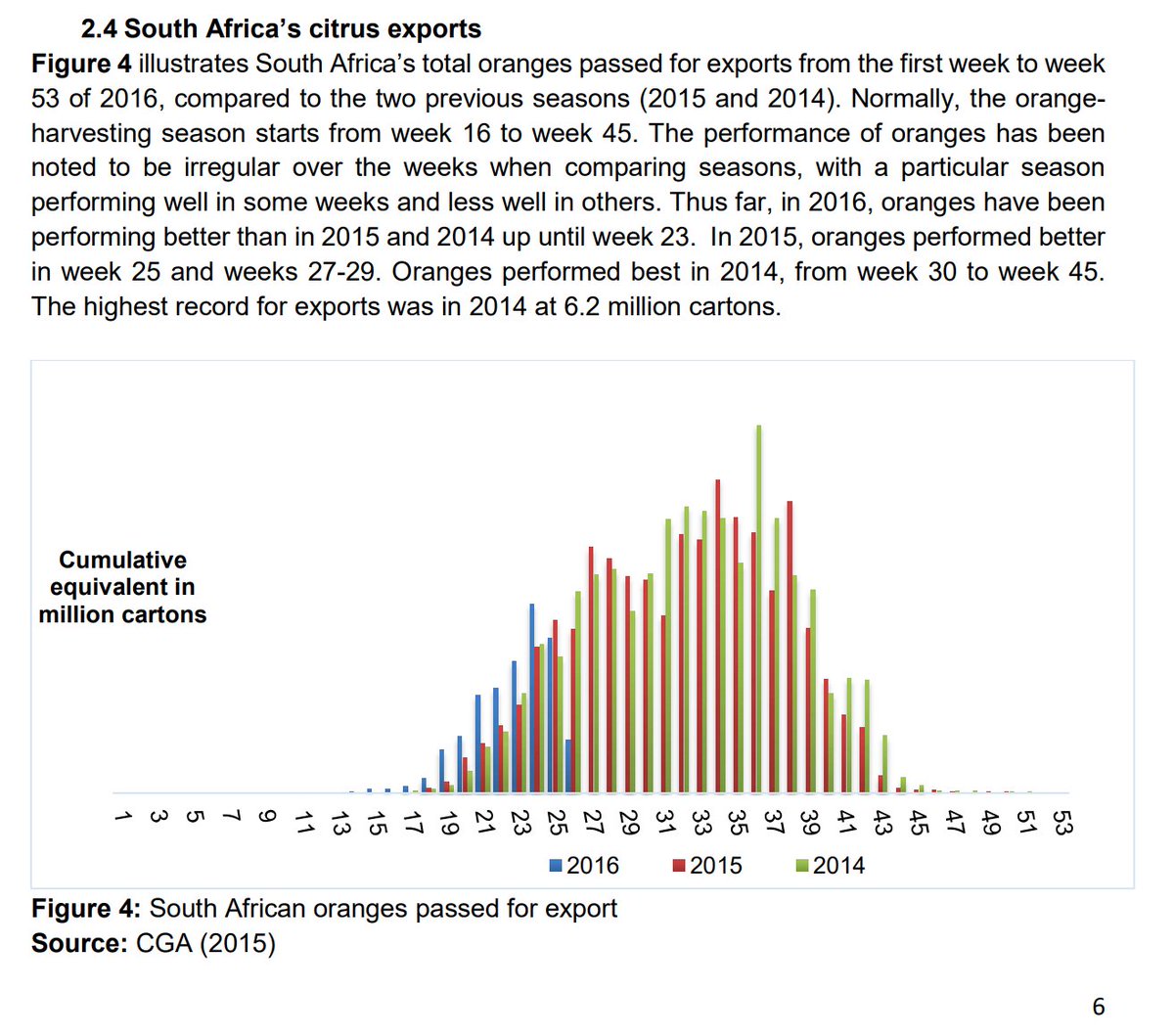
This is the MFN/WTO tariff when there's no FTA in place.
Jan - Mar = 16% +€7.1/100kg
Apr = 10.4% +€7.1/100kg
1-15 May = 4.8% +€7.1/100kg
16-31 May = 3.2% +€7.1/100kg
1 Jun - 15 Oct = 3.2%
16 Oct - 30 Nov = 16%
Dec =16% + €7.1/100kg
tradebetablog.files.wordpress.com/2017/02/1220-0… :page 43
So the tariff rates are lowest right through the period when exports from the southern hemisphere are at their greatest, and highest when exports are at their lowest point. But it's important to realise that those rates only apply outside of a free trade agreement.
Remember, Dan Lewis said that Spain, has taken "very badly" to the removing of import tariffs on citrus fruits from South Africa.
What was that about then?
Well it's very simple. South Africa as one of the SADC nations had signed a FTA with the EU on 10 June 2016.

The MEPs were concerned about the extension of 0% tariffs to cover the overlap in Nov and while their concerns were noted it is absurd to think that the terms a free trade agreement were overturned because of a single question in the EU Parliament.
europarl.europa.eu/sides/getDoc.d…

The EPA with the SADC came into force on 10 Oct 2016 granting 100% (bar guns) duty and quota elimination to Botswana, Lesotho, Mozambique, Namibia, and Swaziland and 98.7% elimination for South Africa. This is typical for an FTA. 100% for an EPA.
trade.ec.europa.eu/doclib/docs/20…
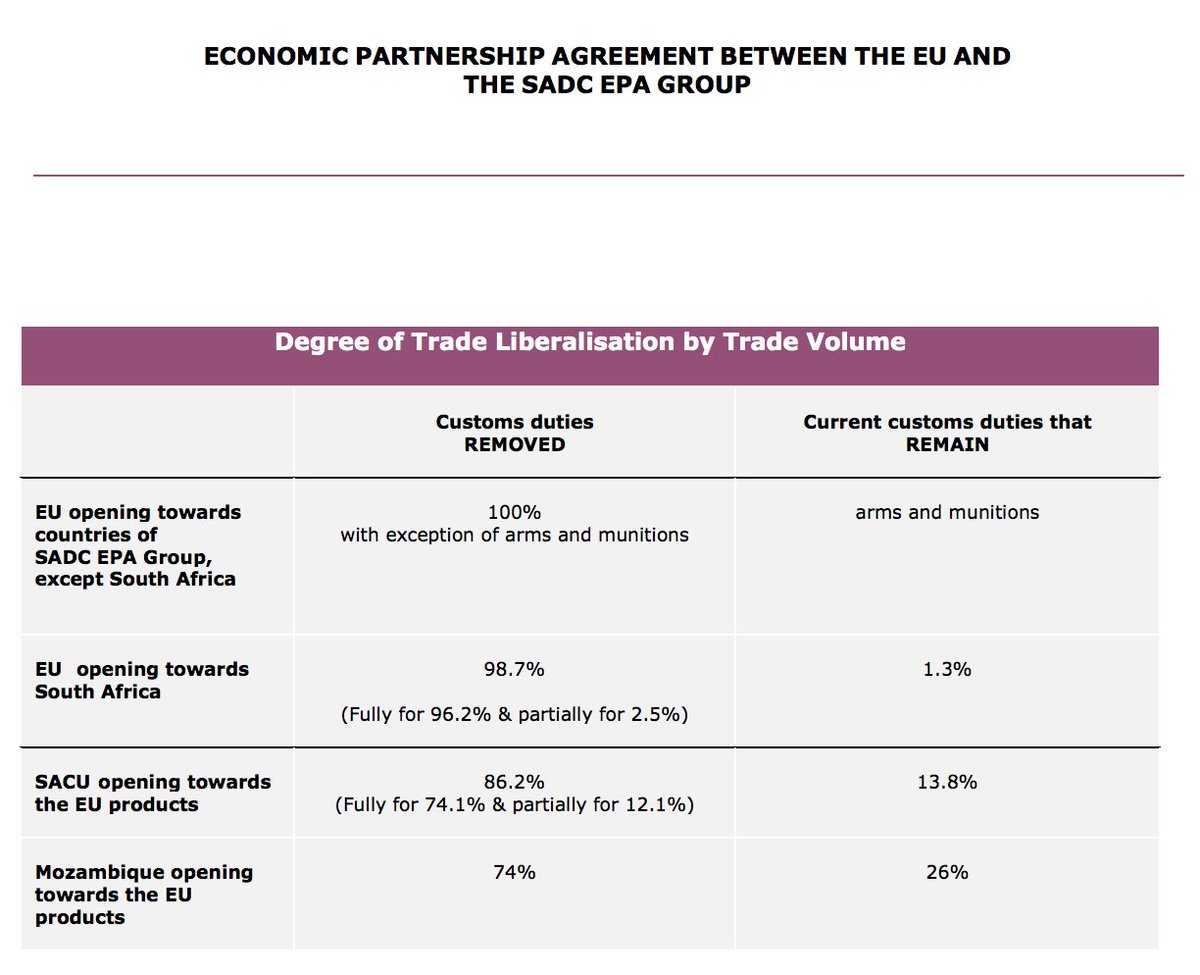
The tariff for oranges from South Africa were liberalised by making it a 0% duty during the full season from June to October, and extending that 0% period to cover all of November within 10 years by phased reductions.
tralac.org/discussions/ar…

Here's part of the text of trade agreement itself to prove it. It clearly shows the schedule for the phased elimination of the tariff to cover mid-October to end of November adding 6 weeks to the 0% period. We're in the normal 0% period now.
trade.ec.europa.eu/doclib/docs/20…
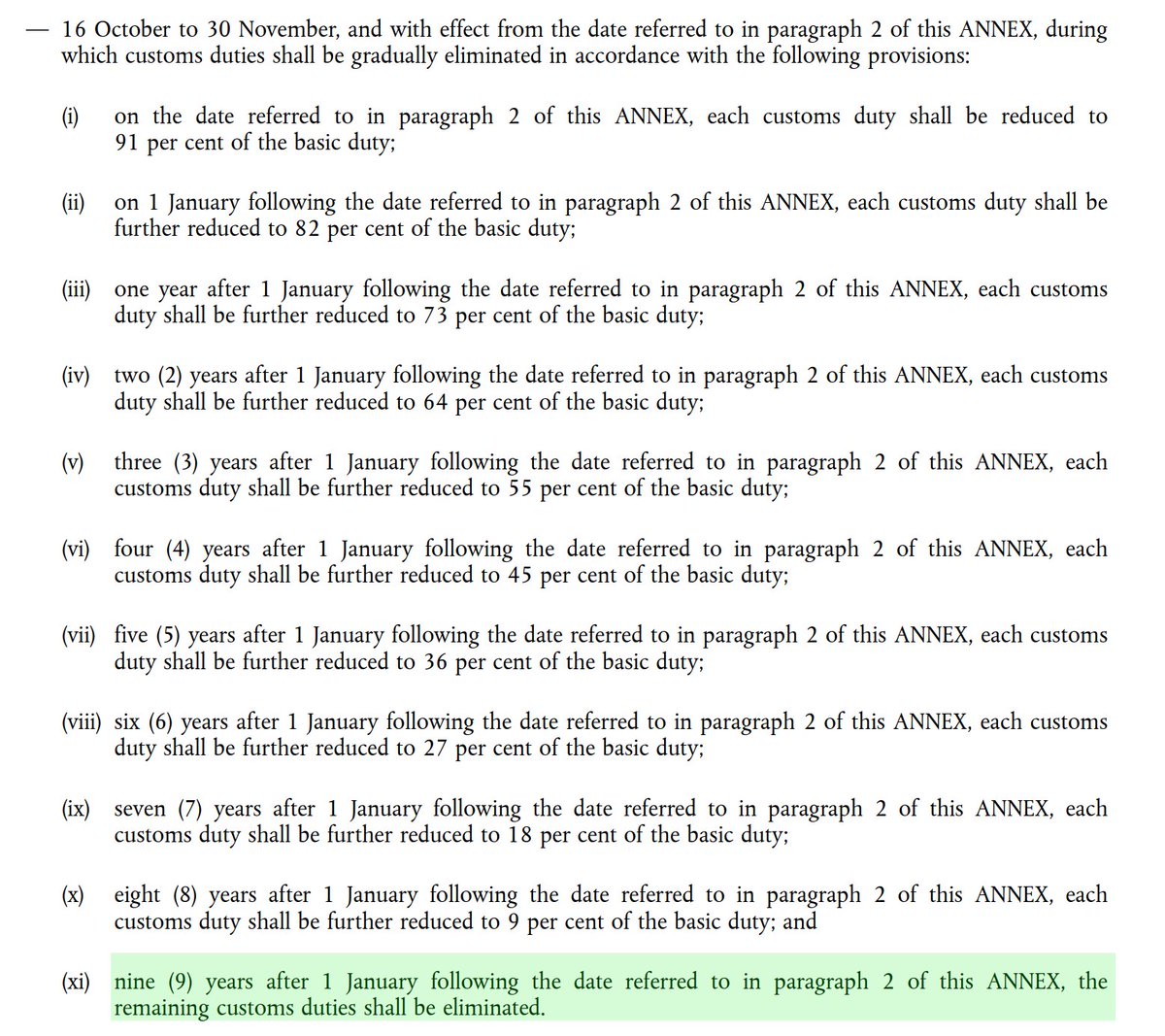
That's why if you use the UK Govt's tariff website and look up South African oranges today you'll see that they come in at 0%. trade-tariff.service.gov.uk/trade-tariff/c…
So Lewis, & Dowd said South Africa was being done over by the EU because a few Spanish MEPs complained. When in reality South Africa had been given preferential access to EU markets 0% duty at the height of their export season.
Is this incompetence or deception?
Perhaps a bit of both, but being generos I'd say a rabid EUphobia clouds their judgement.
But Lewis and Dowd have form here. Here's how Lewis's got his facts completely backwards. A tariff he said was being added was actually being reduced to 0%.
As for Dowd, as you'll see in a moment, he doesn't even know how to read a tariff schedule. In this BrexitCentral article in defence Lord Ridley's claims about African tariffs (another story)
brexitcentral.com/remainer-lord-…
There are a number of problems with his analysis here but this is the most egregious error.
The €45.90, €56.20, €65.90 €64.40 per100kg for various African countries are NOT tariffs.
They are standard import values (SIV) for oranges from those countries.
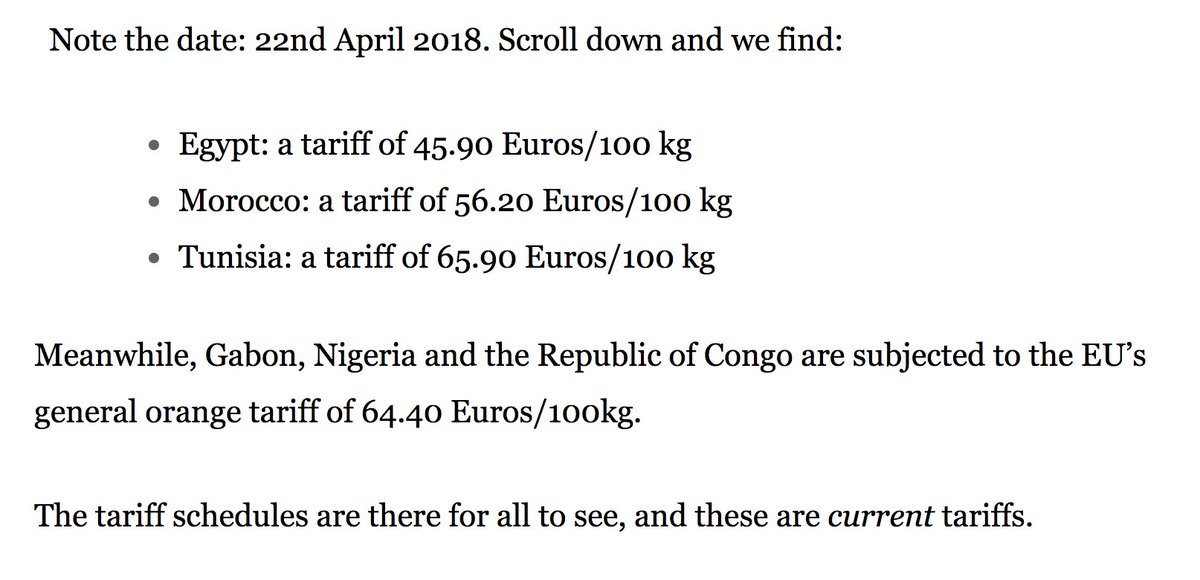
The SIV is used as a base to calculate the % part of a tariff on produce when a consignment does not have an accompanying invoice listing the price per kilo.
"These are current tariffs" he says -- No they'e not.
He's clearly got absolutely no idea what he's looking at!
Let's look at the actual tariff for one of his examples. Morocco
Here's the link for April when he wrote the article. trade-tariff.service.gov.uk/trade-tariff/c…
And here's the section for Morocco clearly showing two lines, one for the SIV and one for the tariff, on a preferential rate!

To find out what the tariff for Morocco is you have click on the conditions link to the right. This opens up the pop-up window shown here. It's got lots of zeros on it.
A tariff of 50cents is applied when the import price drops below €26.40/100kg, and more when lower.
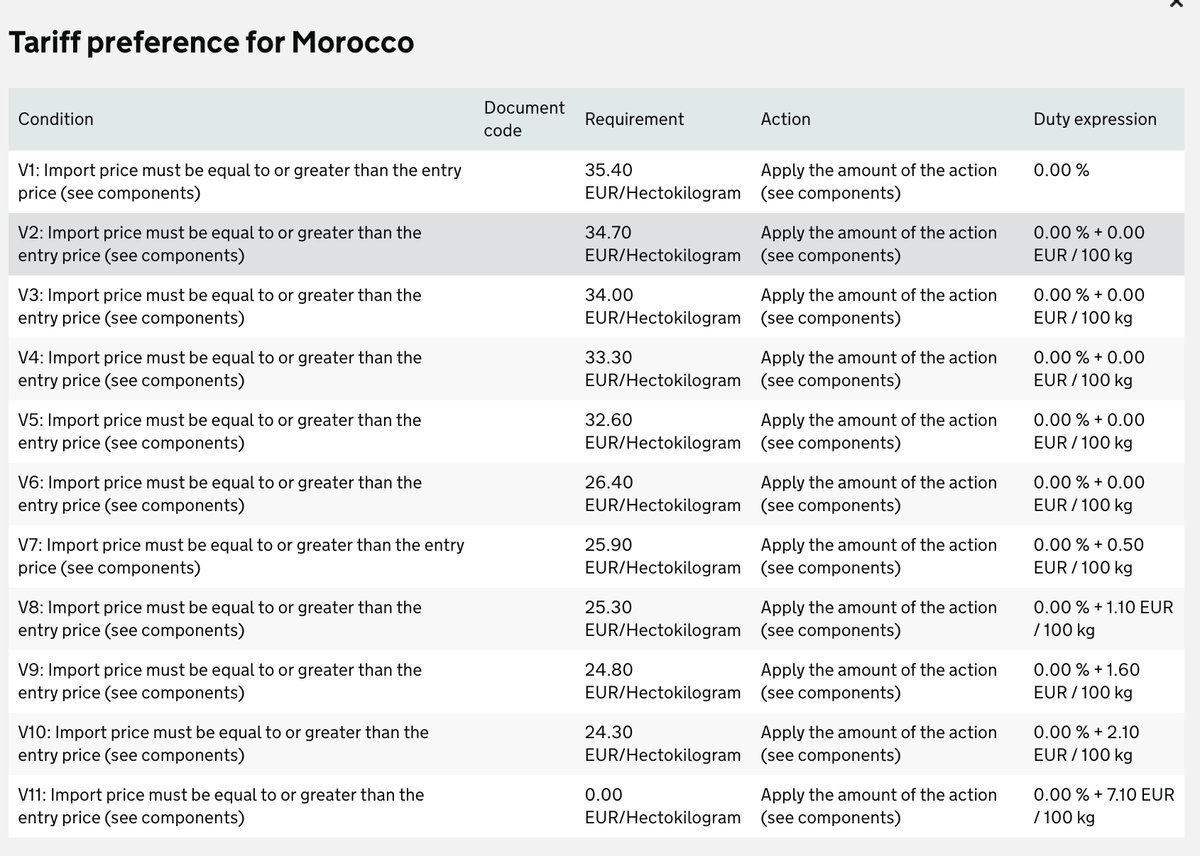
As I showed in another thread Gabon, Nigeria and the Republic of Congo don't even export oranges, not even to their neighbours. Even if he had the right numbers it's a total red-herring.
That was in April during the peak season. What about now in June?
Well here's the tariff on Morocco today. It's a flat 0%
BrexitCentral make a habit of this kind of thing. Whether through incompetence or design, people are being deceived by them.
trade-tariff.service.gov.uk/trade-tariff/c…
Here's a thread that makes a more general point about the EU, tariffs and developing countries.
/END

